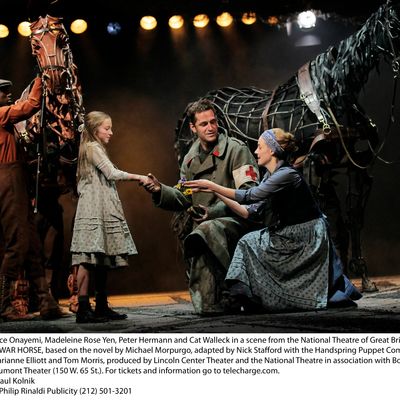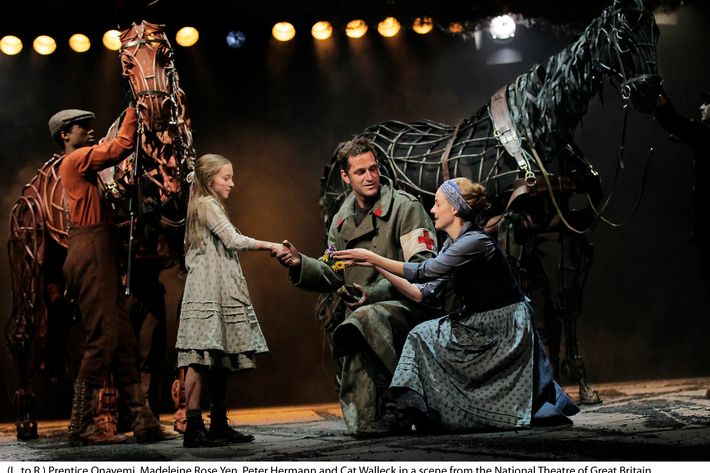

There are many wonders in the Brit import War Horse — the most intense and epic children’s entertainment ever mounted on Broadway, and certainly the greatest achievement in large-scale mainstream puppetry since The Lion King — but none of them can compete with the show’s opening. We meet a horse. He canters, he swats flies with his tail, he flicks his ears at the slightest sound. He breathes. He’s made of cane and silk and leather (by South Africa’s miraculous Handspring Puppet Company, in collaboration with the National Theatre of Great Britain), and operated by a team of people who quickly melt into horseflesh and are forgotten. (Until the curtain call, when they are justly adored.) This horse is alert and alive — so much so, we realize only slowly that the script he’s dragging is neither.
For out of this herbivore Eden, a ghostly chorus emerges, singing a soul-tugging old
hymn (Bonar and Tams’s “Only Remembered”) about suffering, glory, and immortality, three things a horse has no goddamned use for. The foal starts, sensing danger — as do we. Because this, alas, is the last grown-up moment of the evening: Once the vile bipeds start chattering, they don’t stop for two hours, no matter how much we mentally plead. The source novel by Michael Morpurgo is told from the horse’s perspective; the decision to stray from that model I find disappointing. There’s not a single beat of this show that wouldn’t have benefited from wordlessness: Its mute animal energies are far stronger than its wooden text, its simulated beasts far more expressive than their thinly written, bathos-soaked riders, who are, to a man, mouthpieces and messengers, simple mechanisms of plot contingency. The acting style, by necessity, is relentlessly indicative, the dialogue pure Passion Play.
But then, War Horse — the story of a poor farm boy (Seth Numrich) and his beloved mount, Joey, parted by the Great War, searching each other out through a vast no-man’s land mined with cliché and spring-musical accents — is not really designed for adult minds. (Be warned, parents: The British equivalent of children’s entertainment isn’t as shy about carnage and defeat as our comparatively triumphal American version. World War I occupies a very different mythic niche “over there.”) Even the sick joke of cavalry charges in the face of machine-gun fire, one of history’s more disgusting collision points, is absorbed into the show’s standard-issue war-is-bad pacifism (a message blunted — spoiler alert — by the ultimate victory of Providence, at least for our main characters). The ravishing, nightmarish backdrops — horses dragging infernal weaponry through sloughs of mud and blood, demonic tanks emerging from the pit, hurricanes of barbed wire sweeping in from the wings — all but swallow the characters, and I, for one, wish the play’s creators had simply given in to this, and allowed their stock stick figures ( the “good German,” the noble soldier, the cruel soldier, the innocent child) to recede, or at least shut up.
I’ve heard many people comment that, within minutes, they forgot Joey was a puppet: They saw a real horse. I did, too, but with an unfortunate corollary sensation. The more horselike the puppet became, the more puppetlike I found the human actors. Maybe that’s what we look like to a horse?

